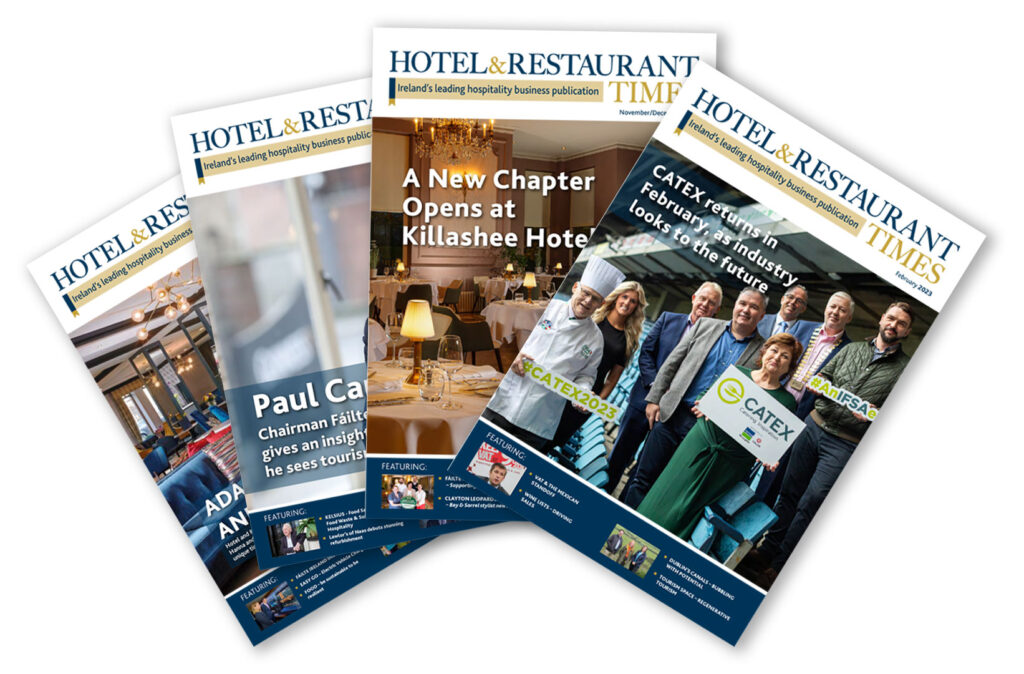
Crowe Predicts 2022 Hotel Revenue to be Down 30% on 2019 Levels
Crowe and Cushman & Wakefield annual joint briefing on the Irish Hotel Sector explores the journey to rebuild hotel profits and valuations
Crowe, Ireland’s leading accountancy practice and advisors to the Irish hotel sector have announced the outlook for the Irish hotel sector based on current trading performance according to their 2020 Annual Hotel Industry Survey. These insights were shared alongside investor sentiment and the development landscape from leading global real estate services firm, Cushman & Wakefield at their joint annual Irish Hotel Market Briefing. As hoteliers struggle to recover from the impact of the pandemic Crowe Partner, Aiden Murphy, warned that many hotels in Ireland will record revenue in 2022 that will be over 30% down on 2019 levels – the last full comparable year of trading prior to the pandemic.
The annual survey serves as the industry’s strongest benchmarking report for revenue, profit, and operational metrics. Insights indicated that the Dublin market will remain most impacted. Despite a strong events and leisure breaks market and predicted recovery in international visitors, it will likely only achieve 70% occupancy level in 2022, a full 12 percentage points down from 2019 levels of 82% occupancy for the Dublin market. Room rates also likely to be at least 25% down on 2019 levels leaving Dublin hotels very challenged for 2022. It is predicted that regional hotels, less reliant on overseas visitors, will not be as severely impacted, especially those hotels that are strong leisure destinations for the domestic market.
The domestic staycations market bolstered demand and fuelled strong room rates over Summer 2021, but the expectation is that Irish trips abroad will rebound strongly in 2022 resulting in record lower average room rates for Summer 2022.
Road to recovery and profitability
The Employment Wage Subsidy Scheme (EWSS), expected to finish at the end of the year, plays a vital role in underwriting a large proportion of payroll costs, keeping many hotels afloat as they operated at significantly lower Revenues. The test for EWSS qualification is that turnover is down at least 30% on the 2019 reference period. As this test will be met by very many hotels in 2022, Crowe recommends that the relief be continued into 2022 to ensure the survival of impacted hotels for at least the medium term until there is a rebound in demand.
Aiden Murphy Manging Partner, Crowe said, ‘Even when hotel profits return, there will be cash flow challenges as many hotels will need fund repayment of warehoused taxes when this fall due from 2023 onwards. The expectation is that it will be 2025 before 2019 profit levels can be attained. Revenues will need to be at least 10% over 2019 levels due to the cost increases eroding profitability during the recovery period. The next 18 months will be very challenging and while the outlook is somewhat gloomy in the short term, the strength of the tourism product and the strength of the Irish economy provide an excellent backdrop and basis to suggest full recovery to pre Covid-19 levels over the medium term.’
Investor sentiment and development landscape
Isobel Horan, Divisional Director, Cushman & Wakefield outlined recent transaction activity across the Irish and EMEA markets, ‘While transaction activity remains muted over the last 18 months, the sentiment in the sector remains positive with transactions in the Irish market for the first half of 2021 already above 2020 levels. Sales concluded so far this year include The Morrison for €68m, The Moxy for €35m and the forward commit of Premier Inn Castleforbes forward sale to Union Investments for €70m.
The key reason for reduced transactional activity over the last 18 months was the lack of assets bring brought onto the market. Many owners were pre-occupied with challenges of the everyday management and held off selling as they didn’t want sales to be viewed as distressed sales. Another feature was the gap between buyer and seller expectations, however, this is expected to narrow down once the performance start to recover.
Ms Horan commented that 2,400 of predominately budget hotel bedrooms will be added to the Irish market in 2021, a category that has been traditionally undersupplied in Ireland.
These room additions are coming via Holiday Inn Express which has recently opened with 421 keys as well as the new domestic brand REZz, which recently opened a 73-bed hotel on McCurtain Street in Cork City. Other large budget hotels opening soon, include Travel Lodge plus Dublin City centre (393 bedrooms) and Motel 1 (310 bedrooms).
Guest speaker at the event, Dermot Crowley, CEO Designate, Dalata Hotel Group, highlighted that getting flight capacity back to 2019 levels is important for occupancy recovery at Irish hotels. He expected strong demand from inbound visitors from the UK in 2022, as there is pent up demand, especially from first-generation Irish, which should help with hotel occupancy rates. The domestic short stay market into Dublin is also likely to rebound strongly especially as better capacity and value will exist compared to 2019.
Dermot noted that new supply coming into the Dublin market is predominantly budget or aparthotel stock, a category that has been historically undersupplied in the Irish market. In Ireland, traditionally only 3-5% of the hotel stock is in the budget category, this compares to the UK the overall budget stock which comprises 30%- 40% of the overall market.
With the re-emergence of the events industry in Ireland, he expects the increase in budget hotel rooms supply to be met with strong demand and will attract its own market as seen elsewhere around the UK and Europe.
















